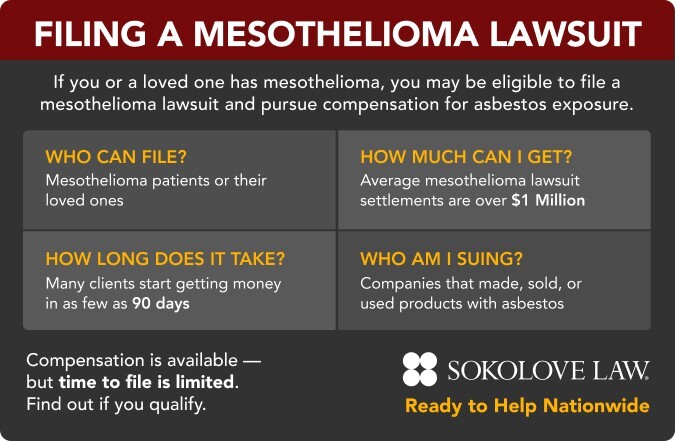Filing a Mesothelioma Lawsuit in 2025
Mesothelioma lawsuits can provide an avenue for the thousands of innocent asbestos exposure victims and their families to seek justice against the company responsible for causing them to get sick.
Many manufacturers chose to continue using asbestos in products after the risks were known. In fact, they even hid the dangers from the public and their workers.
Filing a lawsuit for mesothelioma is an opportunity to fight back against these companies and pursue much-needed financial compensation for your family.
Contact Sokolove Law now for a free legal case review to find out if you can pursue compensation from a mesothelioma lawsuit.
Why File an Asbestos & Mesothelioma Lawsuit?
When you file a mesothelioma lawsuit with Sokolove Law, you can get help securing life-changing resources while facing staggering hospital bills and the emotional strain of a cancer diagnosis.
Mesothelioma cancer lawsuits can help:
- People diagnosed with mesothelioma focus on their health and treatment
- Families tackle the overwhelming cost of mesothelioma treatments or funeral expenses
- Hold manufacturers of asbestos-containing products accountable for their negligence
- Encourage others with asbestos-related illnesses to pursue justice for themselves
You'll have peace of mind that you have the financial resources to cover the expenses of your illness and provide lasting financial security for your family.
A mesothelioma lawsuit is just a little more complicated than a motor vehicle accident lawsuit. The concept is still the same: you hire a lawyer, he determines what products you are exposed to, oftentimes with your help, and then we'll file a lawsuit against the company who made those products. First thing we do, is just trying to get a feel for what disease do you have and then we talk about all the things that a case can bring, the benefits of it, what's the expectations of you, which is very little other than to give us information and then you know what the next steps are. Which the next steps, if you say yes to them, is within 24 hours — but we do it at the client's convenience — we'll go to your home and meet with you. You'll feel like you're in a small office because once you're on your team those are the people you talk to every day. Well, your team is going to be who's going to reach out to you. That team member is going to be the same person that you talk to on day one, two, three, four, and it's gonna be the same person who's sitting next to you at trial, if it goes to trial. Your team will then start investigating to see how you were exposed. Gather all your medical records, etc. Sometimes you have a choice as to where you can file your case, but certain jurisdictions in the United States that move faster by law, that people with mesothelioma must have their cases heard sooner. The national firm, we have that ability to do it wherever is best for you wherever we think is best for you and most of the time we think is best for you is where you can get justice sooner. Our clients could receive compensation in as little as six weeks. The more likelihood is, it would be two or three months, and then you'll probably continue receiving various compensation for another year. The treatment for mesothelioma is extremely expensive. It adds up in travel for treatment, etc. You can relieve some of the stress on the family if you can help them find funding for all of their needs, which may eventually be home care for their loved one. That's where we come in. You know, what are we very good at, is trying to find justice for them, but we're also there to comfort and guide them through their care and through the court system. If you or a loved one has been diagnosed with mesothelioma, Sokolove Law is here to help, call us today at 800-647-3434.
Sokolove Law: Filing Asbestos Lawsuits for Over 45 Years
When you work with Sokolove Law, our mesothelioma law firm will handle every step of the legal process for you, from finding the evidence to filing your lawsuit within any state deadlines.
This way, you can focus on your family and healing, while we take care of all the legal legwork.
Here are a few more ways that Sokolove Law stands out from other firms:
- Decades of Mesothelioma Litigation Experience: Since 1979, Sokolove Law has helped mesothelioma patients and their families get the results they deserve.
- Billions of Dollars in Results: As of March 2025, we’ve recovered over $5.2 Billion on behalf of clients with mesothelioma and their families.
- Databases of Asbestos Exposure Evidence: Our team can determine exactly when, where, and how your exposure to asbestos took place in addition to pinpointing those responsible.
- Thousands Helped Nationwide: We’ve helped over 8,800 clients with mesothelioma and asbestos-related disease across the country — no firm has handled as many of these cases.
- Dedicated Team on Your Side: You get an entire team of experienced legal and medical professionals fighting on your behalf, including a senior shareholder, multiple asbestos attorneys, registered nurses, paralegals, investigators, and more.
- No Financial Risks: There are no hourly fees or out-of-pocket costs to work with us. Our team only gets paid if your case results in compensation.
Let us put our experience to work for you. Call (800) 647-3434 now to see if you have a case.


“Hiring Sokolove Law was the smartest thing we ever did. Filing the lawsuit was easy because the firm made it easy. We didn’t have to do anything.”
– John, Firm Mesothelioma Client
Our Past Mesothelioma Lawsuit Settlements
At Sokolove Law, over 99% of our mesothelioma lawsuits result in settlements — usually without our clients ever having to set foot in court.
When a defendant knows your mesothelioma attorney is prepared to try your case, they’re more likely to settle, especially if your attorney has had success against this defendant in the past.
A few of our many mesothelioma lawsuit settlements and verdicts include:
- $40 Million for a fireman and boiler tender in the U.S. Navy
- $11.49 Million for a Florida demolition worker
- $11.12 Million for a U.S. Air Force veteran
- $10.5 Million for a pipefitter who worked in foundries and refineries
- $9.6 Million for a California construction worker
- $9.3 Million for the family of a U.S. Navy veteran in Massachusetts
- $8.39 Million for a Louisiana well service worker
- $7 Million for a wire installer and laborer
We’ve successfully negotiated thousands of mesothelioma settlements, allowing patients in poor health to receive much-needed compensation faster.
While there’s never a guarantee of compensation in any case, we’ll fight hard to get you everything you’re entitled to.
Average Mesothelioma Lawsuit Settlements
The average mesothelioma lawsuit settlement is valued at between $1 Million and $1.4 Million, while the average mesothelioma verdict amount can be between $5 Million and $11.4 Million.


Compensation from a mesothelioma or asbestos lawsuit can help families pay for treatment costs, expenses insurance doesn’t cover, and more.
Who Can File an Asbestos Exposure Lawsuit?
You may be eligible to file a mesothelioma lawsuit if you’re the:
- Person with an asbestos-related disease like mesothelioma or lung cancer
- Spouse, child, family member, or loved one of the person diagnosed
- Representative of the mesothelioma victim’s estate after their passing
Since you were likely exposed to asbestos decades ago, you may not remember what products you were exposed to or when it took place — but Sokolove Law can figure that out for you.
Call (800) 647-3434 now for free help determining your eligibility to file an asbestos lawsuit. We’re available 24/7.
How to File a Mesothelioma Cancer Lawsuit


Learn more about the steps of the mesothelioma legal process below.
At Sokolove Law, our mesothelioma lawyers are here to help clients understand their potential legal options without any obligation or financial investment.
We offer free legal consultations to determine your eligibility to pursue compensation from a mesothelioma lawsuit. If you have a case, we’ll travel to you whenever and wherever it’s convenient for your family.
Our team understands how fast medical bills can pile up. That’s why we get started on your case as quickly as possible — often within 24 hours of your initial call.
Even if you don’t know how or if you were exposed to asbestos, contact Sokolove Law. Using our databases of evidence and decades of experience, we can determine how you were exposed to asbestos, when it happened, and which companies are to blame.
Our team will work to gather the evidence needed to prove your exposure, which usually includes:
- Employment records
- Medical records and expenses
- Military service records (if applicable)
- Proof the company knew asbestos was dangerous but failed to provide warnings or protection
- Testimony from coworkers, medical experts, and other witnesses
With a better idea of your work history and other possible exposure sources, we’ll then move on to pursuing compensation on your behalf.


“I was surprised at the stuff that my mesothelioma lawyer knew. He just knew the names of all the pumps and the valves going far back….They were prepared. They could go back to Day 1.”
– Walter, U.S. Navy Veteran & Firm Client
When you work with Sokolove Law, we’ll file mesothelioma lawsuits against the companies responsible for your illness. Many cases now involve over 70 defendants — and you may qualify for compensation from each of them.
As part of this process, our team will also pursue compensation from all of the sources available to you in order to maximize the amount of money you receive.
We’ll be sure to explain all the documents as we go, so you're informed every step of the way.
To help you get compensation faster, your legal team will try to negotiate mesothelioma lawsuit settlements with all of the asbestos-related companies responsible for your illness.
Because of our strong track record, over 99% of our mesothelioma lawsuits result in settlements without going to court. Companies know our history of success and often don’t want to risk a battle in court.
The average mesothelioma lawsuit settlement is between $1 Million and $1.4 Million, though we often secure even more for our clients.
Although the vast majority of asbestos lawsuits settle, the rare case may proceed to a trial in court before a judge and jury — and your team will be prepared for it.
Trials can be drawn out and exhausting for families, and the outcome can’t be predicted. If you lose the trial, you don’t get anything. This is why we push for a settlement whenever possible.
Even successful trial verdicts can be appealed by the defendant, who may push the court to reduce or overturn the asbestos verdict.
Mesothelioma Lawsuit Deadline
Known as the statute of limitations, the mesothelioma lawsuit deadline varies from state to state and can be only a couple of years after the victim’s diagnosis or death.
If you miss the deadline, you won’t have another opportunity to file an asbestos lawsuit and pursue compensation for your illness.
Don’t wait and miss out on the money you deserve. Call Sokolove Law right now at (800) 647-3434 to get started.
Mesothelioma Lawsuit Payout Timeline
Within 90 days of contacting us, many clients start receiving compensation. After speaking with you, our team will start building your case and fighting for compensation on your behalf.
As a national law firm, Sokolove Law can file mesothelioma claims in all 50 states. We’ll file your lawsuit in the state that offers you the best chance of getting the most money as quickly as possible.


“I was shocked at how fast Sokolove Law called me. Two days later, they were meeting with me at my house. I was in a mild shock, but it was a good shock.”
– Dennis, Firm Mesothelioma Client
Determining Mesothelioma Lawsuit Payouts
With any legal claim, it’s important to keep in mind that the value of a mesothelioma case can vary greatly, and there’s never a guarantee of success.
That said, our team will fight for the maximum compensation possible in your case.
Mesothelioma lawsuit payouts are influenced by many factors, including the:
- Disease or cancer you’ve been diagnosed with
- Medical expenses, including treatment bills and related costs
- Number of defendants or companies responsible for your illness
- State your claim is filed in
- Strength of evidence collected by your legal team
- Wages lost from being unable to work
With over 45 years of experience and billions in results nationwide, we’re confident in our ability to secure meaningful amounts of financial compensation for our clients.
Types of Asbestos Lawsuits for Mesothelioma
For someone with mesothelioma to receive compensation, they will need an experienced asbestos attorney to help them navigate the legal process.
For over 45 years, Sokolove Law has helped mesothelioma victims understand their options and pursue compensation from all the options available to them, which may include both lawsuits and other types of legal claims like asbestos trusts.
Mesothelioma Personal Injury Lawsuit
Mesothelioma personal injury lawsuits hold specific companies responsible for a single person’s exposure to that company’s asbestos-containing products and resulting illness.
This kind of legal claim allows asbestos exposure victims to seek compensation from the company or companies responsible for causing their illness.
Mesothelioma Wrongful Death Lawsuit
Family members, or anyone who has been court-appointed as the representative of a victim’s estate, may file a mesothelioma lawsuit after death on behalf of someone who has passed away due to mesothelioma.
If the patient passes away before their personal injury claim is completed, their family may continue the claim as a mesothelioma wrongful death lawsuit.
Mesothelioma Class Action Lawsuit
Class action lawsuits for mesothelioma include many people who have similar cases and are filing them as a single case against a company that exposed them to asbestos.
Asbestos and mesothelioma class action lawsuits are no longer heard at the federal level and are almost nonexistent today. Instead, lawsuits for mesothelioma are filed individually as personal injury or wrongful death claims.
Call Sokolove Law at (800) 647-3434 now to learn more about your legal options. It costs nothing to speak with us.
2 Alternatives to Filing an Asbestos Lawsuit
Manufacturers of asbestos-containing products should be held accountable for their negligence, and mesothelioma lawsuits are just one way to do so.
In addition to filing an asbestos lawsuit, you may have other mesothelioma legal options available that can help maximize the compensation in your case.
Both of these options can be filed from the comfort of your own home, which can help you start receiving compensation even sooner.
1. Asbestos Trust Fund Claims
Estimated to still contain over $30 Billion, asbestos trust funds are pools of money set aside by companies that made products with asbestos but later declared bankruptcy.
Average Payout from Asbestos Trust Funds
The courts ordered these bankrupt companies to form trusts to provide compensation to future victims of asbestos-related diseases and their families.
Many clients qualify for compensation from multiple asbestos trust funds — in addition to money from a lawsuit. Let us get you the money you deserve.
Get Compensation Without Going to Court
Our mesothelioma lawyers can determine if you’re eligible for asbestos trust fund compensation — at no cost to you.
2. Mesothelioma VA Claims
Because asbestos was used so widely in the military, veterans make up a third of all new mesothelioma diagnoses each year.
If you suffered military asbestos exposure, you may qualify for a variety of benefits from the U.S. Department of Veterans Affairs (VA).
VA Monthly Payment for Mesothelioma, Plus Free Health Care
We have VA-accredited lawyers on staff who can help you prepare your claim for benefits and pursue compensation from other avenues as well.
It’s important to note that we do not file legal claims against the U.S. military or government. Taking legal action will also not impact any current or future VA benefits.
Asbestos & Mesothelioma Litigation Trends
Mesothelioma litigation involves lawsuits filed by victims of asbestos-related diseases against the companies responsible for their exposure and resulting illnesses.
Over the past year, the number of mesothelioma lawsuits filed nationwide has continued to climb, indicating just how many people are only now becoming sick from their initial exposure.
Find out more about asbestos and mesothelioma litigation trends:
- Total Lawsuits Filed: There were 1,910 mesothelioma lawsuits and 3,787 asbestos lawsuits filed in 2023.
- Types of Illnesses: Approximately 50% of all asbestos lawsuits were for mesothelioma, 40% for lung cancer, and the remaining 10% for other asbestos-related illnesses.
- Number of Defendants: Around 12,000 different defendants were named across all asbestos lawsuits. The average number of defendants named in each asbestos lawsuit was 74.
- Top Filing Locations: The top 5 jurisdictions for case filings were Madison County, IL; St. Clair County, IL; New York, NY; Philadelphia, PA; and Wayne County, MI.
Mesothelioma attorneys fought hard for victims to have access to the legal system and the compensation they deserve. Learn more about the history of asbestos litigation.
Our Mesothelioma Lawsuit Lawyers Can Help in All 50 States


Our mesothelioma lawsuit lawyers will handle every step of the legal process on your behalf, and we only get paid if your case results in compensation.
Filing a lawsuit can secure crucial resources for your family and hold the companies responsible for your illness accountable — but you only have a limited amount of time to take action.
Start the process right now by calling (800) 647-3434 or requesting a free case review. Remember, it costs nothing to speak to us.
Asbestos & Mesothelioma Lawsuit Questions
What is the mesothelioma lawsuit about?
A mesothelioma lawsuit is a product liability claim filed by victims and their families against the companies that made the asbestos-containing products they used or worked with.
Many of these companies knew about the dangers their products posed — but actively hid this information from the public.
As a result, mesothelioma victims are able to seek justice and compensation from those responsible for their illness. Get started now with a free legal case review.
Who can sue for mesothelioma?
You may be eligible to sue for mesothelioma if you received the cancer diagnosis or represent the estate of someone who passed away from this cancer.
Generally speaking, this often includes:
- The mesothelioma cancer patient
- Their spouse or children
- Their siblings or family members
- The representative of the victim’s estate
Contact us for free help determining your eligibility. Call (800) 647-3434 now.
Why do people sue for mesothelioma?
People sue for mesothelioma to secure compensation for medical care and hold asbestos-related companies accountable for knowingly exposing them to dangerous products without warning.
By filing a mesothelioma lawsuit, victims and their families can get help paying for medical expenses and send a strong message that negligent companies must face the consequences of their actions.
At Sokolove Law, we've helped thousands of families nationwide get meaningful results. These companies know the quality of our work and often don't want to risk a legal battle, helping us secure justice even faster.
Who is liable for mesothelioma?
The companies that made or sold asbestos-containing products can be held liable or responsible for mesothelioma and other asbestos-related diseases like lung cancer.
Many of these companies knew about the risks of asbestos when they used the mineral in their products — but they hid the dangers from their workers and the public.
Our veteran clients are often concerned about suing the government or U.S. military, but that's not something we do, even if your exposure occurred during service. Instead, we'll file claims against the companies that sold these dangerous products to the military.
What are the requirements for the mesothelioma lawsuit?
Mesothelioma lawsuit criteria revolve around your attorney proving how you were exposed to asbestos and establishing a link between the exposure and your diagnosis.
In general, the requirements for a mesothelioma lawsuit include:
- Medical records confirming your mesothelioma diagnosis
- Evidence of the asbestos-containing products you were exposed to, which may be found in employment records, military service records, and witness testimonies
- Proof that the companies who made or sold these products knew about the dangers of asbestos but hid the risks
If you or a loved one has been diagnosed with mesothelioma, our team can take care of the rest, from finding the evidence to filing your claim.
Contact Sokolove Law now. It costs nothing to find out if you may be eligible to file a mesothelioma lawsuit.
How long do I have to file a mesothelioma lawsuit?
Only a couple of years after the diagnosis of an asbestos-related disease or death of the victim. The mesothelioma lawsuit statute of limitations varies from state to state — and can be as little as 1 year.
The state you live in may not be where you file your claim, so it’s very important to contact our mesothelioma law firm right now to figure out how much time you have. Don’t miss out on the money you deserve.
How much does it cost to file a mesothelioma cancer lawsuit?
There are no hourly fees or upfront costs to file a mesothelioma cancer lawsuit with Sokolove Law.
Our team works on a contingency-fee basis, which means we only get paid if you get compensation. There are no financial risks to taking legal action.
What is the average settlement for mesothelioma lawsuits?
Average mesothelioma lawsuit settlements usually fall between $1 Million and $1.4 Million, while the average for mesothelioma verdicts can range from $5 Million to $11.4 Million.
How long does a mesothelioma lawsuit take?
Only a couple months. In fact, many of our clients start receiving compensation in as few as 90 days.
While some cases may take a few months, the mesothelioma lawsuit timeline will vary based on the type of claim you file and whether it results in a settlement or has to go to trial.
At Sokolove Law, we understand time is of the essence for patients with this aggressive cancer. We’ll fight hard to get you the results you deserve as quickly as possible.
Can I file a mesothelioma lawsuit after the death of a family member?
Yes. Even if your family member has already passed away, you may still be able to file a mesothelioma lawsuit after their death.
Mesothelioma wrongful death lawsuits can be filed by the spouse, children, sibling, or other estate representative of someone whose life was needlessly taken by asbestos exposure.
We can help you figure out your legal options for free.
Will I need to travel to file an asbestos lawsuit?
When you work with Sokolove Law, our attorneys will travel to you, whenever and wherever it’s convenient for you and your schedule. We try to minimize any disruptions for patients and their loved ones.
Your testimony is a crucial part of the case, and typically, we can record any statements you need to make in the comfort of your home or at a treatment center.
Simply call (800) 647-3434 now for a free case review to find out if you’re eligible to file a mesothelioma and pursue compensation.
Can I still file a mesothelioma asbestos lawsuit if the company responsible is gone?
In a way, yes. While the company responsible for your illness may be bankrupt or owned by another company now, you may still be able to file a legal claim for compensation.
The courts ordered these bankrupt companies to establish asbestos trust funds to provide money to future victims. These bankruptcy trusts now total an estimated $30 Billion and are designed to quickly pay out any valid claims — without having to go to court.
In many cases, clients qualify for compensation from both mesothelioma asbestos lawsuits as well as multiple asbestos trust funds claims. Call (800) 647-3434 now to see what you qualify for.
Is mesothelioma a class action lawsuit?
Mesothelioma cases are rarely filed as class actions in 2025. Historically, mesothelioma class action lawsuits have resulted in far less compensation for victims than what's awarded from individual lawsuits.
At Sokolove Law, we only file individual mesothelioma lawsuits for asbestos exposure victims or their loved ones, so families can get the compensation they deserve.
Are mesothelioma lawsuit settlements taxable?
Mesothelioma lawsuit settlements are generally not taxed. Legal compensation for physical injuries or illnesses is typically exempt from federal income tax, according to the IRS.
If your case proceeds to trial and you’re awarded money from a mesothelioma lawsuit verdict, a portion of these funds may be taxed. Find out more about taxes on asbestos lawsuit settlements.
What was the first asbestos lawsuit?
In 1966, the first asbestos lawsuit was filed by Claude Tomplait, an insulation worker who was diagnosed with asbestosis. His attorney took legal action against 11 different insulation manufacturers, including the Johns Manville Corporation.
What was the famous asbestos lawsuit for mesothelioma?
Arguably the most famous asbestos lawsuit for mesothelioma, Borel v. Fibreboard Paper Products Corporation marked the first successful claim against asbestos-related companies for failing to warn about the dangers of their products.
Decided in 1973, this case opened the door for thousands of similar lawsuits to be filed and brought widespread attention to the health hazards of asbestos.





